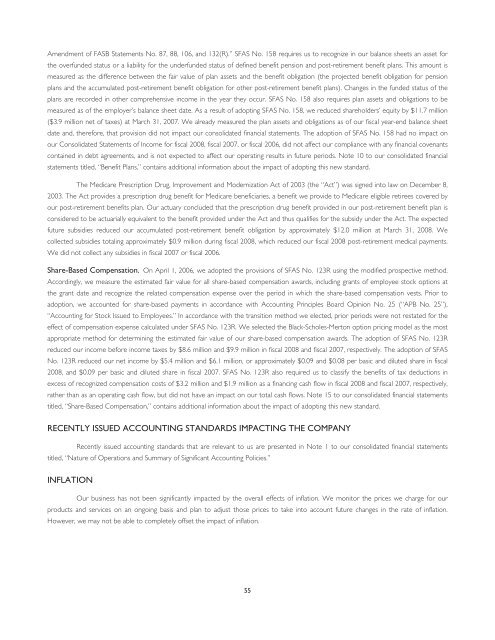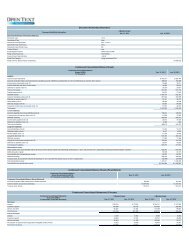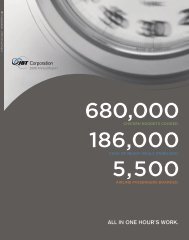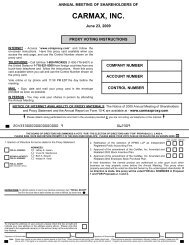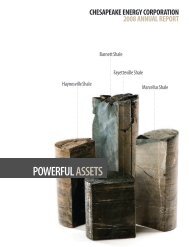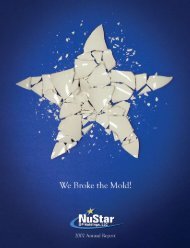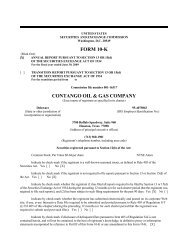On the Surface
On the Surface
On the Surface
Create successful ePaper yourself
Turn your PDF publications into a flip-book with our unique Google optimized e-Paper software.
Amendment of FASB Statements No. 87, 88, 106, and 132(R).” SFAS No. 158 requires us to recognize in our balance sheets an asset for<br />
<strong>the</strong> overfunded status or a liability for <strong>the</strong> underfunded status of defined benefit pension and post-retirement benefit plans. This amount is<br />
measured as <strong>the</strong> difference between <strong>the</strong> fair value of plan assets and <strong>the</strong> benefit obligation (<strong>the</strong> projected benefit obligation for pension<br />
plans and <strong>the</strong> accumulated post-retirement benefit obligation for o<strong>the</strong>r post-retirement benefit plans). Changes in <strong>the</strong> funded status of <strong>the</strong><br />
plans are recorded in o<strong>the</strong>r comprehensive income in <strong>the</strong> year <strong>the</strong>y occur. SFAS No. 158 also requires plan assets and obligations to be<br />
measured as of <strong>the</strong> employer’s balance sheet date. As a result of adopting SFAS No. 158, we reduced shareholders’ equity by $11.7 million<br />
($3.9 million net of taxes) at March 31, 2007. We already measured <strong>the</strong> plan assets and obligations as of our fiscal year-end balance sheet<br />
date and, <strong>the</strong>refore, that provision did not impact our consolidated financial statements. The adoption of SFAS No. 158 had no impact on<br />
our Consolidated Statements of Income for fiscal 2008, fiscal 2007, or fiscal 2006, did not affect our compliance with any financial covenants<br />
contained in debt agreements, and is not expected to affect our operating results in future periods. Note 10 to our consolidated financial<br />
statements titled, “Benefit Plans,” contains additional information about <strong>the</strong> impact of adopting this new standard.<br />
The Medicare Prescription Drug, Improvement and Modernization Act of 2003 (<strong>the</strong> “Act”) was signed into law on December 8,<br />
2003. The Act provides a prescription drug benefit for Medicare beneficiaries, a benefit we provide to Medicare eligible retirees covered by<br />
our post-retirement benefits plan. Our actuary concluded that <strong>the</strong> prescription drug benefit provided in our post-retirement benefit plan is<br />
considered to be actuarially equivalent to <strong>the</strong> benefit provided under <strong>the</strong> Act and thus qualifies for <strong>the</strong> subsidy under <strong>the</strong> Act. The expected<br />
future subsidies reduced our accumulated post-retirement benefit obligation by approximately $12.0 million at March 31, 2008. We<br />
collected subsidies totaling approximately $0.9 million during fiscal 2008, which reduced our fiscal 2008 post-retirement medical payments.<br />
We did not collect any subsidies in fiscal 2007 or fiscal 2006.<br />
Share-Based Compensation. <strong>On</strong> April 1, 2006, we adopted <strong>the</strong> provisions of SFAS No. 123R using <strong>the</strong> modified prospective method.<br />
Accordingly, we measure <strong>the</strong> estimated fair value for all share-based compensation awards, including grants of employee stock options at<br />
<strong>the</strong> grant date and recognize <strong>the</strong> related compensation expense over <strong>the</strong> period in which <strong>the</strong> share-based compensation vests. Prior to<br />
adoption, we accounted for share-based payments in accordance with Accounting Principles Board Opinion No. 25 (“APB No. 25”),<br />
“Accounting for Stock Issued to Employees.” In accordance with <strong>the</strong> transition method we elected, prior periods were not restated for <strong>the</strong><br />
effect of compensation expense calculated under SFAS No. 123R. We selected <strong>the</strong> Black-Scholes-Merton option pricing model as <strong>the</strong> most<br />
appropriate method for determining <strong>the</strong> estimated fair value of our share-based compensation awards. The adoption of SFAS No. 123R<br />
reduced our income before income taxes by $8.6 million and $9.9 million in fiscal 2008 and fiscal 2007, respectively. The adoption of SFAS<br />
No. 123R reduced our net income by $5.4 million and $6.1 million, or approximately $0.09 and $0.08 per basic and diluted share in fiscal<br />
2008, and $0.09 per basic and diluted share in fiscal 2007. SFAS No. 123R also required us to classify <strong>the</strong> benefits of tax deductions in<br />
excess of recognized compensation costs of $3.2 million and $1.9 million as a financing cash flow in fiscal 2008 and fiscal 2007, respectively,<br />
ra<strong>the</strong>r than as an operating cash flow, but did not have an impact on our total cash flows. Note 15 to our consolidated financial statements<br />
titled, “Share-Based Compensation,” contains additional information about <strong>the</strong> impact of adopting this new standard.<br />
RECENTLY ISSUED ACCOUNTING STANDARDS IMPACTING THE COMPANY<br />
Recently issued accounting standards that are relevant to us are presented in Note 1 to our consolidated financial statements<br />
titled, “Nature of Operations and Summary of Significant Accounting Policies.”<br />
INFLATION<br />
Our business has not been significantly impacted by <strong>the</strong> overall effects of inflation. We monitor <strong>the</strong> prices we charge for our<br />
products and services on an ongoing basis and plan to adjust those prices to take into account future changes in <strong>the</strong> rate of inflation.<br />
However, we may not be able to completely offset <strong>the</strong> impact of inflation.<br />
55


